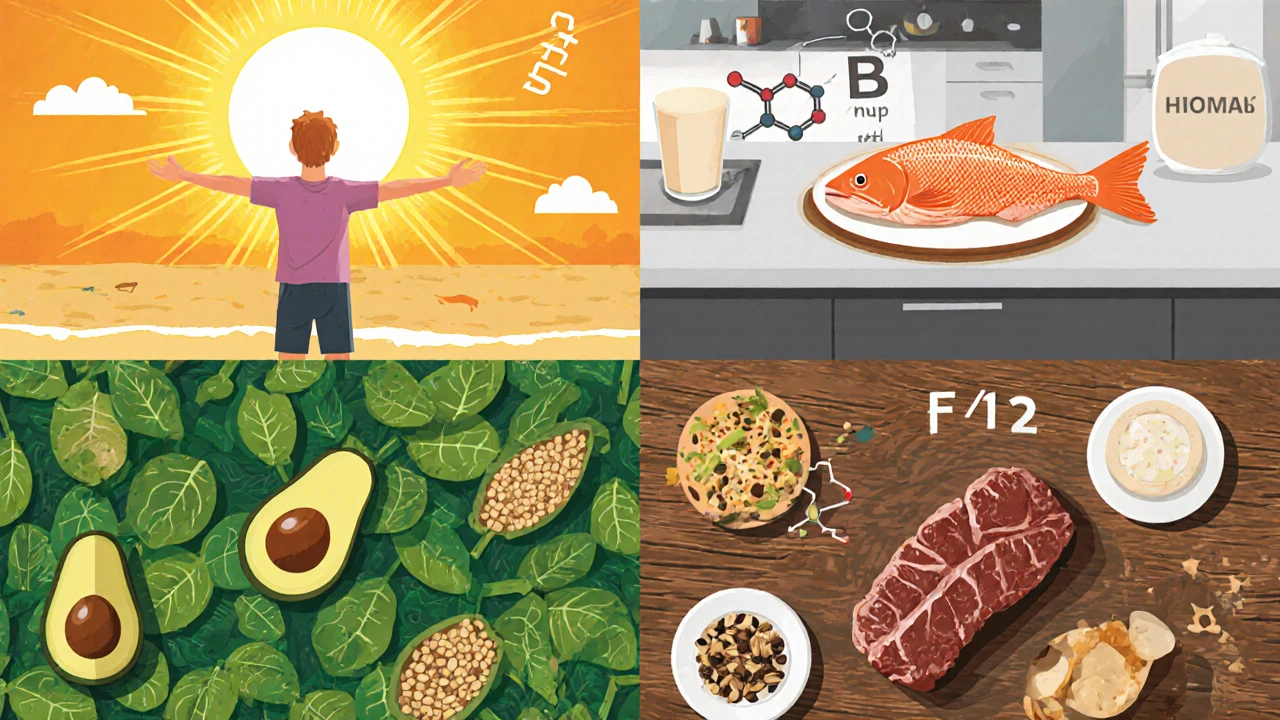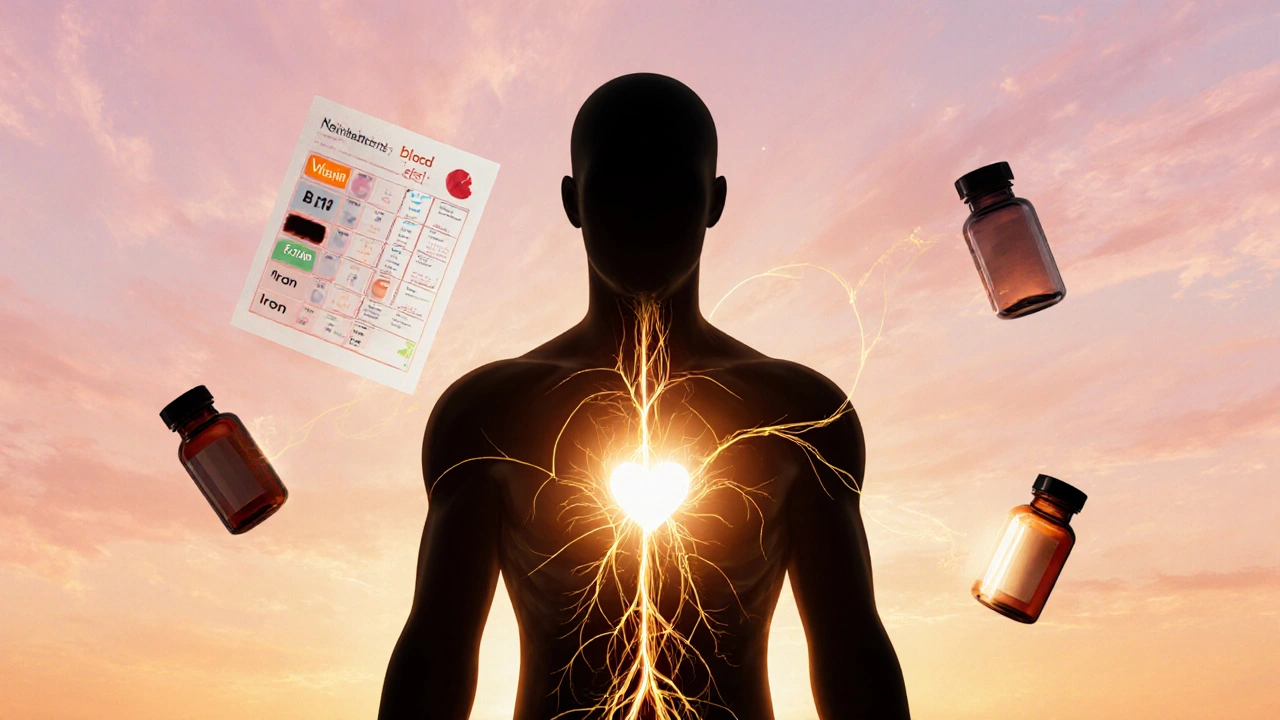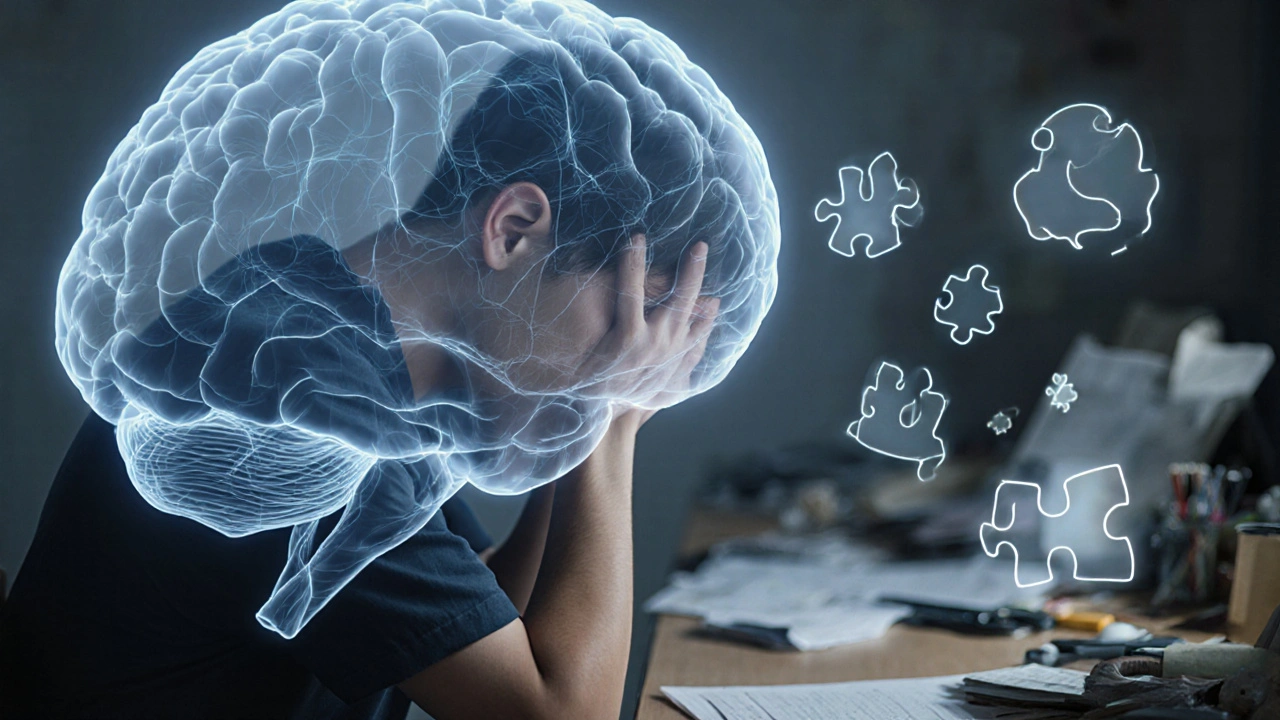Vitamin Deficiency Mood Disorder Checker
This tool helps identify possible connections between vitamin deficiencies and mood disorders. It's designed for educational purposes only and should not replace professional medical advice.
Check Your Symptoms
Key Vitamins to Consider
Vitamin D
Linked to seasonal depression and mood regulation. Deficiency common in winter months or those with limited sun exposure.
Vitamin B12
Supports nervous system function. Deficiency causes anxiety, brain fog, and cognitive issues.
Folate (B9)
Essential for neurotransmitter synthesis. Deficiency linked to depressive symptoms.
Iron
Carries oxygen and supports dopamine synthesis. Deficiency causes fatigue and mood swings.
Analysis Results
Ever wonder why a bad mood sometimes feels unshakeable, even after a night of sleep? The cause isn’t always stress or life events-often a missing nutrient is pulling the strings. When key vitamins fall short, the brain’s chemistry gets out of balance, leading to anxiety, depression, or mood swings. Below we unpack which deficiencies matter most, how they alter brain function, and what you can do to get back on track.
Quick Takeaways
- Vitamin D, B12, folate, and iron are the top culprits behind low mood.
- Deficiencies can be confirmed with a simple blood test.
- Whole‑food sources plus targeted supplements often restore balance faster than lifestyle changes alone.
- Over‑supplementing can cause toxicity; stick to recommended doses.
- Addressing deficiencies is a complement, not a replacement, for professional mental‑health care.
Why Vitamins Matter for Brain Chemistry
Vitamins act as co‑enzymes that power countless biochemical pathways. In the brain, they help produce Serotonin, a neurotransmitter that regulates mood, appetite, and sleep. When a vitamin that assists serotonin synthesis is low, the messenger can’t be made in sufficient quantities, leaving you feeling down or wired.
Other neurotransmitters-dopamine, norepinephrine, GABA-also depend on vitamins for their production and re‑uptake. A shortfall in any of these systems can tilt the emotional scales.
Vitamin D: The Sunshine Factor in Depression
Vitamin D is a fat‑soluble vitamin that the skin creates when exposed to UVB sunlight. Beyond bone health, research from the University of Cambridge (2023) showed that adults with serum 25‑OH‑D levels below 20ng/mL were 2.5times more likely to meet criteria for major depressive disorder.
The link stems from vitamin D receptors located throughout the brain, especially in regions that control mood, such as the prefrontal cortex. Low vitamin D reduces the expression of genes that synthesize serotonin and brain‑derived neurotrophic factor (BDNF), both essential for mood stability.
Seasonal affective patterns-feeling blue in winter-often reflect this deficiency. People living farther from the equator, like in Sydney’s winter months, are especially vulnerable.
Vitamin B12: Guarding Against Anxiety and Cognitive Fog
Vitamin B12 (cobalamin) supports myelin formation, the protective sheath around nerve fibers. When B12 drops below 200pg/mL, nerve signaling slows, producing anxiety, irritability, and the “brain fog” many attribute to stress.
Older adults, vegans, and people on proton‑pump inhibitors are the groups most at risk. A 2022 randomized trial in the Journal of Psychiatric Research found that supplementing 1,000µg of methylcobalamin daily for eight weeks cut anxiety scores by 30% compared with placebo.
Beyond mental health, B12 deficiency can cause numbness, balance problems, and anemia-so a blood panel often reveals multiple clues.

Folate (Vitamin B9): The Mood‑Lifting B‑Vitamin
Folate, or vitamin B9, is a key player in the one‑carbon cycle that converts homocysteine to methionine. High homocysteine levels have been linked to depressive symptoms because they damage blood vessels in the brain.
Studies in the American Journal of Clinical Nutrition (2021) reported that participants who increased folate intake from 200µg to 400µg per day experienced a 15% reduction in depressive scores after six months.
Leafy greens, legumes, and fortified cereals are the easiest ways to raise folate without resorting to pills.
Iron: When Fatigue Turns Into Mood Swings
Iron carries oxygen in hemoglobin and supports dopamine synthesis. Low iron-often manifesting as anemia-means the brain receives less oxygen, leading to irritability, restless legs, and even panic attacks.
A meta‑analysis published in Nutrients (2020) found that iron supplementation (18mg elemental iron daily) improved mood in women of reproductive age more than a placebo, especially when baseline ferritin was under 30µg/L.
Because iron absorption can be blocked by calcium or phytates, timing supplements with vitaminC‑rich foods boosts uptake.
Spotting the Signs of a Deficiency
- Persistent low mood or loss of interest lasting more than two weeks.
- Unexplained anxiety, racing thoughts, or panic episodes.
- Physical clues: fatigue, muscle weakness, tingling, or frequent infections.
- Changes in sleep patterns-either insomnia or oversleeping.
- Cravings for non‑food items (pica) can indicate iron deficiency.
If you tick several of these boxes, a simple blood panel can pinpoint the missing nutrients.
Testing and Diagnosis
Ask your GP for a "nutrient panel" that includes serum 25‑OH‑D, vitaminB12, folate, ferritin, and complete blood count (CBC). Results are interpreted as follows:
- Vitamin D: <20ng/mL = deficient, 20‑30ng/mL = insufficient.
- Vitamin B12: <200pg/mL = deficient, 200‑300pg/mL = borderline.
- Folate: <3ng/mL = low.
- Ferritin: <15µg/L = iron deficiency, 15‑30µg/L = low stores.
These numbers give a clear roadmap for treatment.
Food First: Building a Mood‑Boosting Diet
Targeted nutrition often outperforms generic supplements because whole foods provide synergistic compounds.
- Vitamin D: Fatty fish (salmon, mackerel), fortified milk, egg yolks. Aim for 600-800IU daily; sunlight exposure for 10‑15minutes mid‑day on clear days adds a natural boost.
- Vitamin B12: Shellfish, liver, dairy, and fortified plant milks for vegans. A weekly serving of 100g liver covers the daily requirement.
- Folate: Spinach, broccoli, lentils, avocado. One cup of cooked lentils supplies ~360µg of folate.
- Iron: Red meat, pumpkin seeds, quinoa, and legumes. Pair iron‑rich meals with a squeeze of lemon to enhance absorption.
Consistently hitting these food targets can raise serum levels within 6‑8 weeks.

When Supplements Make Sense
If dietary changes are insufficient-like for vegans missing B12 or people with limited sun exposure-high‑quality supplements fill the gap.
- Vitamin D3: 2,000IU daily for adults with low baseline; split the dose if you experience stomach upset.
- Methylcobalamin B12: 500‑1,000µg sublingual daily, especially for people over 60.
- Folate: 400‑800µg as methylfolate; avoid synthetic folic acid if you have MTHFR variants.
- Iron: 18mg elemental iron with vitaminC; pause supplementation if ferritin rises above 100µg/L to prevent overload.
Always re‑test after 3 months to confirm levels are improving.
Potential Pitfalls of Over‑Supplementation
More isn’t always better. Excess vitaminD can cause hypercalcemia, leading to nausea and kidney stones. Too much iron triggers oxidative stress and may worsen mood. High B12 doses can mask underlying folate deficiency, creating a false sense of security.
Stick to the recommended daily allowance (RDA) unless a clinician advises otherwise.
Comparison of Key Vitamins and Their Mood Impacts
| Vitamin / Mineral | Primary Mood Effect | RDA (Adults) | Top Food Sources |
|---|---|---|---|
| Vitamin D | Reduces depressive symptoms | 600-800IU | Salmon, fortified dairy, sunlight |
| Vitamin B12 | Alleviates anxiety, improves clarity | 2.4µg | Shellfish, liver, fortified plant milks |
| Folate (B9) | Stabilizes mood, lowers homocysteine | 400µg DFE | Spinach, lentils, avocado |
| Iron | Improves energy, reduces irritability | 8mg (men), 18mg (women) | Red meat, pumpkin seeds, quinoa |
Bringing It All Together
Addressing vitamin deficiencies is a practical, evidence‑backed way to support mental health. While supplements can’t replace therapy or medication when needed, correcting a nutritional gap often reduces the dose of antidepressants or eases anxiety without additional medication.
Start with a blood test, adjust your diet, and consider a targeted supplement regimen. Monitor your mood weekly and re‑test after a few months-your brain will thank you.
Frequently Asked Questions
Can low vitamin D cause depression on its own?
Low vitamin D isn’t the sole cause of depression, but studies show it significantly increases risk. Restoring levels often improves symptoms, especially in winter‑related mood dips.
What are the best foods to boost B12 without meat?
Fortified nutritional yeast, plant‑based milks, and B12‑fortified cereals provide reliable amounts. A daily serving of fortified soy milk (≈2.5µg B12) meets most adult needs.
Is it safe to take a high‑dose iron supplement if I feel fatigued?
Only after a blood test confirms low ferritin. Unchecked high‑dose iron can cause constipation, nausea, and oxidative damage.
How long does it take to see mood improvement after correcting a deficiency?
Most people notice changes within 4‑6weeks, but full stabilization may take 3‑6months, depending on the severity and the nutrient involved.
Should I combine supplements with my antidepressant medication?
Always discuss with a doctor. Some nutrients, like vitaminD, can safely augment treatment, but others, like high‑dose iron, may interact with certain drugs.

